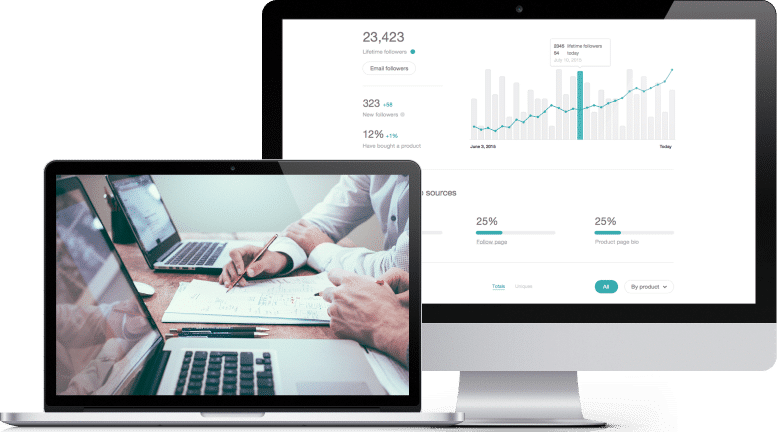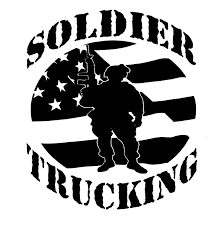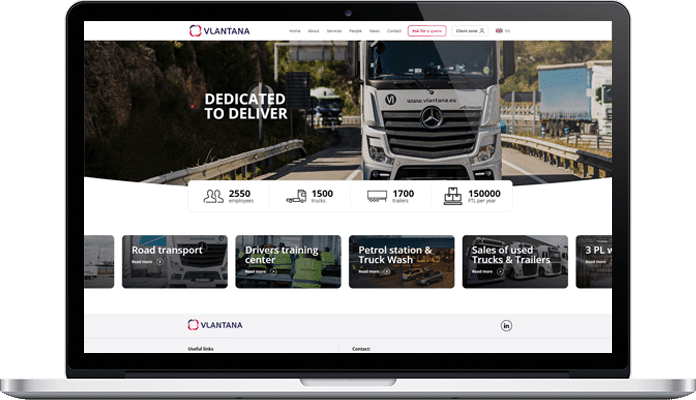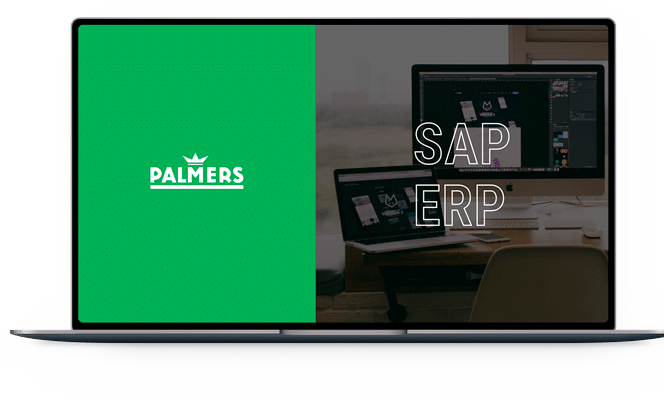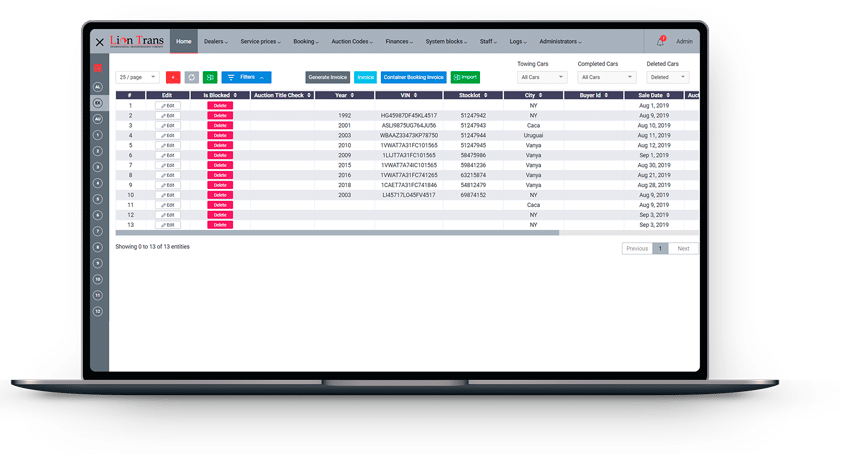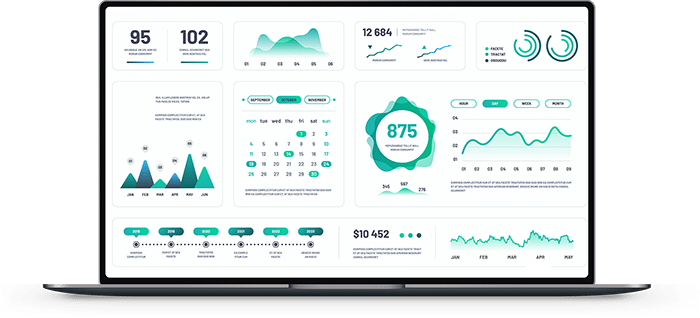Robust and efficient supply chains are blood vessels that keep the modern economy going by uniting manufacturers, suppliers, distributors, retailers, and consumers into a close-knit system. The supply chain management (SCM) software development services we provide will ensure your enterprise has everything it needs for nonstop operation, enabling its personnel to manage all business processes across the entire production flow—from sourcing raw materials to shipping finished goods.
Our supply chain software development services
Custom supply chain software development
Custom software always emphasizes your company’s uniqueness. One-size-fits-all solutions can hardly work better than tailor-made supply chain software designed strictly to your requirements. Our approach to your production process can provide what any company appreciates in supply chain management: the just-in-time reaction to emerging needs that refer to replenishment. We can create an individual innovative inventory system immediately, signaling to restock your warehouse when any item leaves.
SCM web and mobile development
Even though supply chains are usually multifaceted, their remote management can be arranged via web and mobile solutions with sufficient computing capacities. Neither an excessive staff member is always present personally at all links of your supply chain, nor is day-and-night monitoring via in-office desktop systems necessary when the internet coverage and the variety of mobile technologies allow your SCM system to work on your smartphone. We can develop web and mobile SCM solutions that help you be aware of the status of your production flow anytime, anywhere.
SCM software audit and consulting
Our professional audit and consulting services are always available to identify potential problems in your SCM software. Do your customers order more than you can deliver or vice versa? Do they complain of insufficient service? If your current SCM system does not allow you to anticipate either the shortage or overstocking, some system updates or even reconfiguration seem to be necessary. Our experts are here to analyze your SCM software before your customers are entirely disappointed.
Maintenance and technical support
If your business keeps developing, your supply chain management has to do the same. More deals imply more interactions between all links of your supply chain. Maintenance and technical support can never go amiss amid the growing complexity of your production flow. We provide the full scope of work to keep your SCM system always up-to-date. Moreover, our specialists can dynamically optimize your SCM software’s parameters to meet any new challenge in your industry segment.
Logistics management
Typically, logistic processes are administered via a dedicated module within an SCM system. We can craft standalone logistics software solutions to streamline and facilitate freight operations, essentially automate the shipping pipeline, reduce delivery time, cut down on costs, and provide improved customer service, implementing logistics optimization on a large scale. Besides, we can integrate them into your current ecosystem to maximize their value and provide seamless functioning of the enterprise’s digital environment.
Supply chain analytics
Supply chain operations generate vast volumes of data; it would be a shame to let it go down the drain. The data analytics solutions we build enable entrepreneurs to make sense of this vast bulk of business information by pinpointing trends and anomalies across the entire supply chain. Then, business analysts and C-suite managers can leverage these valuable insights for operational and strategic decision-making, fine-tuning or even radically overhauling routine supply chain processes, and exercising continuous improvement of the supply chain lifecycle.
Get a professional consultation on your supply chain software project!
Must-have features for supply chain software
Our best-in-class custom development services are honed for building bespoke SCM solutions containing any modules your organization needs in its business operations. The basic features ensuring smooth supply chain performance include.
Inventory management
Often combined with warehouse management systems, the inventory management module enables real-time monitoring of supply levels across all warehouses, depots, and distribution centers, helping companies prevent stockouts and avoid overstocking. We can enhance regular inventory management systems with advanced capabilities (automated reordering, dynamic buffer management, inventory control, replenishment recommendations, and more), enabling them to radically improve operational efficiency and optimize inventory management to the maximum.
Transportation management
This feature ensures uninterrupted inbound and outbound movement of goods by air, land, and sea. It allows personnel to control transportation processes across the entire lifecycle, which includes planning, execution, follow-up, and evaluation. It is highly instrumental in conducting intelligent batching, optimizing fleet management, choosing the shortest itinerary, avoiding choke points and traffic jams, reducing excess trips, cutting down on travel costs, analyzing weather conditions along the delivery route, and more.
Supplier relationship management
You can’t build a stable and extended supply chain unless you establish a strong and lasting rapport with your business partners. The supplier relationships management (SRM) module streamlines supply chain planning and ensures consistency of your procurement processes. Using it, you can assess current suppliers’ performance, determine the potential risk of collaboration with each, dissect the supply base, and craft tailored strategies for interaction with individual companies. Such an approach allows you to forge strong ties with partners and foster mutual trust in cooperation.
Order management
Order management systems are mission-critical tools for delivering the ultimate customer experience. They guarantee consumers get their goods on time, tracking the order from the moment it is received to the moment of its delivery. To ensure the item never gets lost and is shipped on time, order management software relies on electronic data interchange with the CRM and inventory management module, enabling real-time order status tracking, and has omnichannel integration capabilities across multiple sales platforms to make the customer journey from coast to coast as comfortable as possible.
Document management
Supply chain operations involve handling numerous documents. The larger the company, the more likely it is to be snowed under the plethora of papers it has to deal with. A document management tool can significantly streamline the red tape routine by helping employees collect, process, and categorize records pertaining to supply chain workflows. Moreover, the state-of-the-art solutions we build allow enterprises to usher in document management process automation and ensure immediate access to the necessary files from any device with an SCM application installed.
Supply chain finance
Generally, all financial operations are performed within the accounting module of the company’s ERP. However, some organizations prefer to have a specialized feature responsible for supply chain finances. By having such capability in place, businesses obtain complete visibility of the trapped capital and insights concerning cash flow conversion cycles. With such information at their fingertips, personnel can optimize financial processes related to the supply chain pipeline and maximize its ROI.
Capacity planning
This custom asset tracking software increases supply chain visibility and enables companies to align customer demand planning with available manufacturing and storage capacities. Thanks to the module, enterprises can develop a comprehensive capacity utilization plan that covers their current and future business needs related to the choice and usage of machinery, asset performance optimization, and bottleneck elimination. Potential scenarios it envisages help balance demand and supply coordination to maximize the efficiency of the available working capital.
Performance measurement
Supply chain management efforts depend critically on the efficiency of the workforce. The performance measurement functionality allows businesses to assess how well they fulfill their responsibilities. It offers a set of KPIs (productivity rate, error rate, work quality appraisal, absenteeism/overtime indices, etc.) used for evaluating employee performance and provides a methodology for such assessment. The metrics’ flexibility allows managers to align them with the organization’s business objectives and benchmark obtained results against industry standards, identifying areas for improvement.
Predictive analytics
Future-proofing is a vital element of any company’s activity. You can’t hit it big if you don’t try to anticipate market development scenarios and predict consumer preference dynamics. This software is honed to sift through multiple historical and real-time data points concerning internal and external factors, expose patterns, and make accurate predictions. Armed with such information, businesses can perform demand forecasting, exercise proactive risk management, improve strategic planning, and make knowledgeable decisions at each stage of the supply chain lifecycle.
Self-service portal
It is not an obligatory functionality, yet by implementing it, companies can release pressure on their staff and allow suppliers, retailers, distributors, and other partners to handle various workflows independently. The company determines the scope of the self-service portal’s capabilities, and we will satisfy its requirements by enabling external users to manage orders, resolve queries, access documentation, manage accounts, update product catalogs, track shipments, submit invoices, and perform other shop floor operations.
Benefits of our supply chain software development services
Our supply chain software development process
Our SDLC
Discovery phase
Architecture and design
Development
Testing and QA
Deployment
Maintenance
What impacts your project duration
Despite many SCM software solutions looking similar, they may require different completion periods. Especially when it comes to the highly customized software products we propagate. Software development is a very artistic process that implies many non-trivial approaches, the timeframe of which is hardly predictable. Nonetheless, our specialists can make more or less precise calculations of the working hours necessary to complete the project when the software development specification (SDS) is available. In general, the following factors should be taken into consideration:
- Project requirements
- Expected deadlines
- Team composition
- Chosen technology and platforms
What affects your project costs
As in the case of project duration, each SCM system’s cost depends on the developed software’s final configuration. There is a direct correlation between the work required to complete the project and the final cost. We always represent a transparent calculation in which even customers who stay far from software development can find exhaustive information about why the solution costs what it does. Such info usually includes the following cost-determining factors inter alia:
- Project scope and complexity
- Chosen technology
- Project completion urgency
- Engagement model: Time and Material, Dedicated Team
What we need from your side
We never require a ready-to-use SDS from our customers: creating such a document is far from what they do in their business. However, we seek to have as tight a collaboration as possible with our clients to avoid any misunderstanding in the future development process. That’s why we propose arranging face-to-face meetings (the online ones are also acceptable) to reach a shared project vision through the most natural communication. If such meetings appear problematic for some reason, we’d like to get the following data from customers to start our work:
- Project goals, vision, and a roadmap, if available
- High-level project requirements
- Project-specific documentation, if available
- Client’s availability for weekly gathering session
Our tech stack
Our achievements
Testimonials
Explore our supply chain management software development case studies
Frequently asked questions
What are the must-have features of supply chain management software?
Neither overstocking nor understocking should happen at your warehouses to compromise your business sustainability. The inventory and stock management features help optimize your stock levels, therefore. The highly configurable billing management feature allows you to process orders from a single location in your SCM system. You should have a transportation and dispatch management feature in your SCM software for efficient shipping of raw materials and finished products. A portal for communication with suppliers and customers makes your entire supply chain work smoothly. The end-to-end tracking feature provides you with real-time info about everything that happens within your supply chain. The features mentioned above are essential for any SCM system. At the same time, you can develop any other feature according to your particular requirements.
What are the latest technologies used for logistics software solutions?
The integrated AI, augmented intelligence, is a promising trend, especially in warehouse management. The technology combines human experience with AI algorithms that are capable of delivering helpful suggestions based on stats and big data. IoT sensors are another trend that facilitates real-time tracking of vehicles and products that move over the entire supply chain. Distributed ledger technology, better known as a blockchain, offers a revolutionary approach to inventory management. The technology provides the most secure data sharing, protected by cryptographic encryption. Finally, the last-mile delivery is the emerging trend that implies the urbanization of deliveries, comprising various methods of shipping automation and ML-based predictive analytics. We can implement any of the technologies into your bespoke SCM software.
Why is moving supply chain software to the cloud popular nowadays?
Cloud migration is a megatrend covering everything in the global digital environment. Cloud providers offer almost unlimited computing capacities and enormous data storage space at a very reasonable price (monthly/annual subscription model). Besides, the cybersecurity properties of in-cloud solutions outperform those inherent in most on-premise systems. The functionality and complexity of supply chain management software make any SCM system a perfect candidate to migrate to the cloud. We have vast hands-on experience in cloud migration of various sorts, along with sufficient expertise to create a cloud-based SCM solution from scratch.

